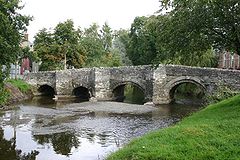Clun
| Clun | |
|---|---|
 Clun Bridge over the River Clun |
|
| Clun shown within Shropshire | |
| Population | 680 (2011 Census) |
| OS grid reference | SO302808 |
| Civil parish | |
| Unitary authority | |
| Ceremonial county | |
| Region | |
| Country | England |
| Sovereign state | United Kingdom |
| Post town | CRAVEN ARMS |
| Postcode district | SY7 |
| Dialling code | 01588 |
| Police | West Mercia |
| Fire | Shropshire |
| Ambulance | West Midlands |
| EU Parliament | West Midlands |
| UK Parliament | |
Clun /ˈklʌn/ Welsh: Colunwy is a small town in south Shropshire, England, and the Shropshire Hills Area of Outstanding Natural Beauty. The 2011 census recorded 680 people living in the town. Research by the Campaign for the Protection of Rural England suggests that Clun is one of the most tranquil locations in England.
Clun takes its name from the river upon which it stands. Deriving from an earlier Colunwy, it shares its very early British root with the two rivers Colne, in Lancashire and Essex, each of which has a town of the same name on its banks.
Clun grew up around the site of the later Saxon church towards the end of the 7th century AD. However, in the surrounding area there was a scattered population at least as early as the Neolithic period, about 5000 years ago. Clun was on the historic drove road where flocks and herds were driven from Wales to the markets in the Midlands and London. At the time of the Norman Conquest Clun formed part of the extensive lands of Eadric the Wild, who led a revolt against King William I, whereon his lands were confiscated and given to Roger de Montgomery who was created Earl of Shrewsbury. Roger in turn granted 27 manors, of which Clun was the largest, to Robert (or "Picot") de Say. These lands constituted a single Marcher Lordship which became known as the Barony of Clun.
...
Wikipedia

